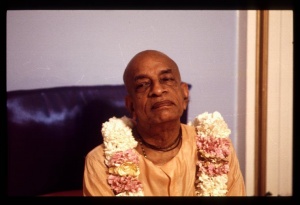CC Madhya 19.186: Difference between revisions
m (1 revision(s)) |
No edit summary |
||
| Line 1: | Line 1: | ||
{{ | [[Category:Sri Caitanya-caritamrta - Madhya-lila Chapter 19|C186]] | ||
<div style="float:left">'''[[Sri Caitanya-caritamrta|Śrī Caitanya-caritāmṛta]] - [[CC Madhya|Madhya-līlā]] - [[CC Madhya 19|Chapter 19: Lord Śrī Caitanya Mahāprabhu Instructs Śrīla Rūpa Gosvāmī]]'''</div> | |||
<div style="float:right">[[File:Go-previous.png|link=CC Madhya 19.185|Madhya-līlā 19.185]] '''[[CC Madhya 19.185|Madhya-līlā 19.185]] - [[CC Madhya 19.187|Madhya-līlā 19.187]]''' [[File:Go-next.png|link=CC Madhya 19.187|Madhya-līlā 19.187]]</div> | |||
{{CompareVersions|CC|Madhya 19.186|CC 1975|CC 1996}} | |||
{{RandomImage}} | |||
==== TEXT 186 ==== | ==== TEXT 186 ==== | ||
<div | <div class="verse"> | ||
hāsyo ’dbhutas tathā vīraḥ | :hāsyo ’dbhutas tathā vīraḥ | ||
karuṇo raudra ity api | :karuṇo raudra ity api | ||
bhayānakaḥ sa-bībhatsa | :bhayānakaḥ sa-bībhatsa | ||
iti gauṇaś ca saptadhā | :iti gauṇaś ca saptadhā | ||
</div> | </div> | ||
| Line 14: | Line 18: | ||
==== SYNONYMS ==== | ==== SYNONYMS ==== | ||
<div | <div class="synonyms"> | ||
''hāsyaḥ''—laughter; ''adbhutaḥ''—wonder; ''tathā''—then; ''vīraḥ''—chivalry; ''karuṇaḥ''—compassion; ''raudraḥ''—anger; ''iti''—thus; ''api''—also; ''bhayānakaḥ''—fear; ''saḥ''—along with; ''bībhatsaḥ''—disaster; ''iti''—thus; ''gauṇaḥ''—indirect; ''ca''—also; ''saptadhā''—seven kinds. | |||
</div> | </div> | ||
| Line 21: | Line 25: | ||
==== TRANSLATION ==== | ==== TRANSLATION ==== | ||
<div | <div class="translation"> | ||
“‘Besides the five direct mellows, there are seven indirect mellows, known as laughter, wonder, chivalry, compassion, anger, disaster and fear.’ | “‘Besides the five direct mellows, there are seven indirect mellows, known as laughter, wonder, chivalry, compassion, anger, disaster and fear.’ | ||
</div> | </div> | ||
| Line 28: | Line 32: | ||
==== PURPORT ==== | ==== PURPORT ==== | ||
<div | <div class="purport"> | ||
This verse is found in the Bhakti-rasāmṛta-sindhu (2.5.116). | This verse is found in the ''Bhakti-rasāmṛta-sindhu'' (2.5.116). | ||
</div> | </div> | ||
__NOTOC__ | |||
<div style="float:right; clear:both;">[[File:Go-previous.png|link=CC Madhya 19.185|Madhya-līlā 19.185]] '''[[CC Madhya 19.185|Madhya-līlā 19.185]] - [[CC Madhya 19.187|Madhya-līlā 19.187]]''' [[File:Go-next.png|link=CC Madhya 19.187|Madhya-līlā 19.187]]</div> | |||
__NOTOC__ | |||
__NOEDITSECTION__ | |||
Revision as of 02:16, 4 September 2021
Śrī Caitanya-caritāmṛta - Madhya-līlā - Chapter 19: Lord Śrī Caitanya Mahāprabhu Instructs Śrīla Rūpa Gosvāmī

His Divine Grace
A.C. Bhaktivedanta Swami Prabhupada
A.C. Bhaktivedanta Swami Prabhupada
TEXT 186
- hāsyo ’dbhutas tathā vīraḥ
- karuṇo raudra ity api
- bhayānakaḥ sa-bībhatsa
- iti gauṇaś ca saptadhā
SYNONYMS
hāsyaḥ—laughter; adbhutaḥ—wonder; tathā—then; vīraḥ—chivalry; karuṇaḥ—compassion; raudraḥ—anger; iti—thus; api—also; bhayānakaḥ—fear; saḥ—along with; bībhatsaḥ—disaster; iti—thus; gauṇaḥ—indirect; ca—also; saptadhā—seven kinds.
TRANSLATION
“‘Besides the five direct mellows, there are seven indirect mellows, known as laughter, wonder, chivalry, compassion, anger, disaster and fear.’
PURPORT
This verse is found in the Bhakti-rasāmṛta-sindhu (2.5.116).